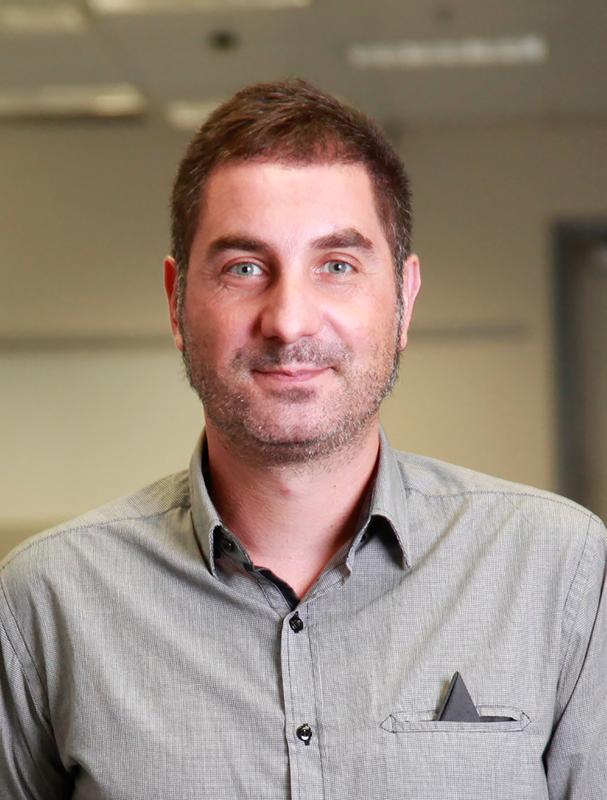Microbes to fight fatty liver disease

Project coordinator Gianni Panagiotou Leibniz-HKI
Headed by Gianni Panagiotou from the Leibniz Institute for Natural Product Research and Infection Biology (Leibniz-HKI) in Jena, eight European scientists have joined forces to improve the diagnosis and therapy of non-alcoholic fatty liver disease. As part of the Innovative Training Network BestTreat, which is funded by the European Commission, they intend to train 15 doctoral researchers from September on.
Partners from Finland, Denmark, the Netherlands and Germany work together in the network and combine their scientific expertise in systems biology, human biology and microbiology to tackle this complex topic. The common goal is to identify specific patterns in the composition of the intestinal microbiome that can be used to diagnose and predict the course of the disease.
In addition, therapeutic approaches will be developed to restore the balance of the intestinal microbiome. For example, certain microorganisms will be used as so-called biotherapeutics. The young scientists receive interdisciplinary training and spend time visiting the partners during the course of their doctoral thesis. The involvement of companies allows to close the gap between academic research on the cause of the disease and the development of new diagnostic and therapeutic methods in industry.
“The cooperation of partners from different disciplines and the participation of companies opens up completely new possibilities: Not only can we elucidate the role of the intestinal microbiome in the development of non-alcoholic fatty liver disease, but we also want to develop tools to use the microbiome as a diagnostic and therapeutic tool,” BestTreat coordinator Gianni Panagiotou describes the novel approach.
At the Leibniz-HKI, three of the doctoral researchers in the EU network will work on specific aspects of the extensive research program. “One research focus in Jena is the role of complex microbial communities in the development of diseases. We are very pleased to be able to gain valuable insights with BestTreat using the concrete example of intestinal microbiomes in fatty liver disease,” says Axel Brakhage, Director of the Leibniz-HKI and Chair at the Friedrich Schiller University Jena, welcoming the establishment of the new network.
An underestimated disease
Non-alcoholic fatty liver disease is one of the most common diseases worldwide – it is estimated that up to 27% of the population suffer from it. The symptoms are manifold and range from fatty degeneration to cirrhosis of the liver or even liver cancer. The disease often remains undetected until severe or life-threatening complications occur. Triggers can be, for example, the diet, an imbalance in the intestinal microbiome or genetic factors. However, the underlying mechanisms are still unclear and there is no way of predicting the individual course of the disease.
Gianni Panagiotou
gianni.panagiotou@leibniz-hki.de
Media Contact
More Information:
http://www.hki-jena.deAll latest news from the category: Life Sciences and Chemistry
Articles and reports from the Life Sciences and chemistry area deal with applied and basic research into modern biology, chemistry and human medicine.
Valuable information can be found on a range of life sciences fields including bacteriology, biochemistry, bionics, bioinformatics, biophysics, biotechnology, genetics, geobotany, human biology, marine biology, microbiology, molecular biology, cellular biology, zoology, bioinorganic chemistry, microchemistry and environmental chemistry.
Newest articles

Recovering phosphorus from sewage sludge ash
Chemical and heat treatment of sewage sludge can recover phosphorus in a process that could help address the problem of diminishing supplies of phosphorus ores. Valuable supplies of phosphorus could…

Efficient, sustainable and cost-effective hybrid energy storage system for modern power grids
EU project HyFlow: Over three years of research, the consortium of the EU project HyFlow has successfully developed a highly efficient, sustainable, and cost-effective hybrid energy storage system (HESS) that…

After 25 years, researchers uncover genetic cause of rare neurological disease
Some families call it a trial of faith. Others just call it a curse. The progressive neurological disease known as spinocerebellar ataxia 4 (SCA4) is a rare condition, but its…





















